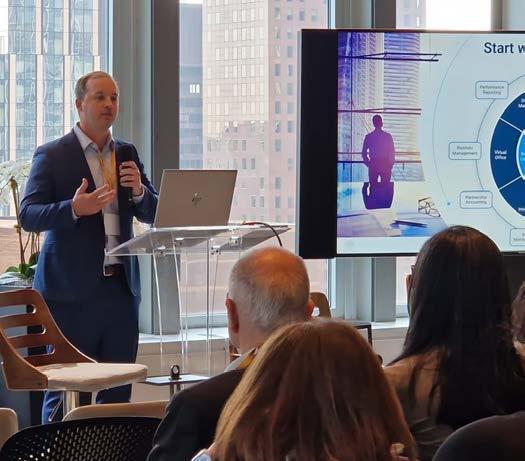
POST-FORUM REPORT:
Family Wealth Report


POST-FORUM REPORT:
Family Wealth Report
A focused exploration of fintech innovation for family offices, covering AI, cybersecurity, ESG, and automation. The 2025 Forum offered insights into leveraging technology to boost efficiency, manage risk, and future-proof operations.









































































WealthBriefing is the leading subscription-based business intelligence service for the wealth management community, with the latest news, analysis and in-depth features from around the globe. WealthBriefing subscribers are part of an international community for whom staying abreast of the latest industry developments is a crucial part of their professional practice. Readers find our content on topics such as strategy, M&A, important people moves, investment management and asset allocation to be an essential resource in a fast-moving world.

















































































































The Asia-Pacific region’s meteoric rise as a major wealth management market has sparked huge demand for region-specific business information. WealthBriefingAsia was launched in 2009 to satisfy this growing information requirement, and it is the only wealth management news site focusing exclusively on the Asia-Pacific region. Providing indispensable news, features and industry views that are always relevant and concise, WealthBriefingAsia allows subscribers to conserve that most precious of all resources: time.











































































The North American wealth management market is one of the largest and most diverse in the world, and is markedly different from those in Europe and the Asia-Pacific region. Multi and single family offices in particular are a well-entrenched,integral part of the private wealth management landscape. Family Wealth Report provides need to know business intelligence in a convenient and easy-to-read format – straight to subscribers’ inboxes every day. Nowhere else will you find such high quality, in-depth and often exclusive content all in one place.








































A unique thought-leadership platform, WealthBriefing’s events foster intellectual debate on the challenges and opportunities facing the industry and are designed to be an optimal use of wealth managers’ precious time and present an excellent networking opportunity.




























WealthBriefing has added to its offering for the global private banking and wealth management communities by running thirteen annual awards programmes for the family office, private banking, wealth management and private client communities. The awards programmes are focused around three main category groupings: experts (individuals and teams); products and services for wealth managers and clients, and institutions of all sizes and types













































WealthBriefing has unrivalled access to the most senior wealth management professionals across the globe, meaning that our research reports represent guides to future best practice as much as being barometers of current industry trends.




















RFPs, Pain Points and Buy-in: Focus on Vendors at Family Office Fintech Forum
Keynote:
The AI-First Family Office: A Blueprint for 2030 & Tech Demo: Meet the AI Accountant: Faster Close & Smarter Decisions for Family Offices
Inside the AI-First Family Office: Evolving the Operating Model for the Next Generation
Family Office Blueprint for Tomorrow
Post Implementation Review
Risk Management Use Case for AI: the Already Here, the Possible and the Unlikely
Sponsors & Partners
CHARLES PAIKERT
US Correspondent New York Family Wealth Report
We report in the first of two articles about discussions held at the family office fintech forum, held by FWR last week in New York.
It’s no surprise that artificial intelligence dominated last week’s Family Wealth Report’s Family Office Fintech Forum. Our first story from the conference (below) covers the new technology’s benefits, caveats around its use, and how family offices can best adopt AI.
Part II will review the best ways for family offices to work with software vendors and will highlight fintech demos from leading vendors. FWR’s US correspondent was there to report on the dialog. (See here for the FWR investment forum, also held last week and reported upon by Charles.)
When it comes to adopting artificial intelligence, family offices are starting from behind, according to Murali Nadarajah, CIO of Eton Solutions. “Very few family offices have adopted AI,” Nadarajah said. Indeed, “It’s not unusual to see family offices use manual punch cards,” said Leanne Haupt, head of family offices for Corient
A big part of the problem is that 75 per cent of fintech software is not designed for family offices, said Alexandre Lin, co-founder and CEO of software firm SumIt. As result, QuickBooks and Excel are the most widely used software products used by family offices, according to Lin and other fintech executives.
But within five years, family offices won’t rely on spreadsheets, manual workflows, or delayed reporting, forum keynote speaker Alex Lee, founder and CEO of fintech accounting firm Truewind maintained. Instead, artificial

intelligence will always be on to transform family office accounting from a back-office function into what Lee called a “strategic financial engine.”
Speeding autonomous operations is AI’s biggest benefit for family offices, Lee said. The new technology scored highest on providing operational efficiency, timeliness and multi-asset complexity, he reported, and lowest on trust and continuity.
Artificial intelligence also helps family offices rapidly process key data points, administrative tasks and statements, documents, capital accounts and tax data said Nadarajah. Processing K1 statements using AI saved his company 200 hours of work a year, Nadarajah estimated. As a result, staff were able convert their time into “higher value” work, he said.
But artificial intelligence “can’t replace human judgement,” cautioned Corient’s Haupt. What’s more, family offices are at risk of losing “authenticity” if they rely too much on AI for written communication, warned Paul Freedland, a PwC partner heading the firm’s Wealth Compass unit. “Our value is where AI ends.”
For all the caveats, family offices can’t ignore artificial intelligence’s ability to end the “document drudgery” of repetitive tasks, said Simran Sandhu, at Citco Fund Services. What’s more, AI’s ability to put an analytical engine on top of foundational data will increasingly allow it to make “intelligent investment decisions” and construct portfolios, added Charles Anselm, co-founder and CEO of Osyte
ADOPTION BEST PRACTICES
So, what should family offices which are considering adopting AI do?

Know the office’s workflow before coming up with a solution, Lin counseled. Understand what the end state looks like and “make sure end users have buy-in,” added Ben Collins, senior director of growth marketing for Sage Intacct. One way to involve end users, said Corient’s Haupt, is by conducting focus groups among the staff to discover particular pain points.
Start using AI on a project of “reasonable size,” Nadarajah counseled. Too often, family offices are “too ambitious,” he said. They also need to remember that AI accuracy can vary between 90 and 99 per cent, and must be carefully monitored by humans. “Think of AI as a platform, not a solution,” he urged the audience.
Design is critical for family offices considering implementing AI, Lin and consultant Wendy McCoy stressed. After gathering as much information as possible, family offices should identify the biggest pain points, they said.
It’s also useful for family offices to talk to their peers and compare notes before getting started. But they need to recognize that family offices will have different operating requirements and comparisons may not be apples to apples, cautioned Josh Kanter, founder and CEO of software firm leaflplanner
Once the decision to implement has been made, “staying in front of the learning curve is super important,” said Jeremy Sisselman, founder and CEO of Bondway. ai. As an example, he cited Deep Research, a new feature of Chat GPT that displays the reasoning behind its answers.
Sisselman also urged new AI users to improve their proficiency with using prompts when asking AI software questions. “Prompts are critical to getting the most out of artificial intelligence,” he said. “And practice makes perfect.”


At the Family Wealth Report Family Office Fintech Forum in Manhattan last week, vendors and other organizations discussed their offering, the issues around applying tech to family offices, and more.
Our first story from the Fintech Forum analyzed the benefits and caveats of artificial intelligence and how family offices can best adopt the new technology. Today, our US correspondent reviews the best ways for family offices to work with software vendors and highlights fintech demos from leading vendors.
For most family offices, implementing new fintech software means working with a third-party vendor, but not always.
While most speakers at the Family Office Fintech Forum agreed that outsourcing was most efficient for family offices, some firms install proprietary systems, primarily for confidentially, according to Erin Hulse, founder and CEO of Deviate Consulting. “The biggest variability is that firms want control of data,” Hulse said.
Before deciding what kind of software a family office should buy, use focus groups to decide where pain points are for staffers, suggested Leanne Haupt, head of family office services for mega RIA Corient. Conversely, family offices should avoid asking the IT department for requirements, she said.
“Make sure the end users have buy-in,” advised Ben Collins, senior director of growth marketing at Sage Intacct, “Be mindful of who’s involved.” Tapping into the experience of software user groups can also be helpful when evaluating different products, said Josh Kanter, founder and CEO of leaflplanner And while family offices are bound to talk to each other and compare notes, Kanter cautioned that they won’t all have the same operating requirements.
When family offices are ready to talk to a vendor, they should have a clear objective of the business case and a timeline in mind, as well as “an understanding of what the end state looks like,” Collins said.
An RFP (request for proposal) should reflect a family office’s unique needs and not be a template, Collins stressed. Similarly, demos from the vendor should be tailored to address an office’s particular needs, said Jack Arrix, director of strategic alliances for Sage.
Above all, the evaluation and negotiation process with vendors shouldn’t be rushed, Arrix said. “That’s a huge red flag that sets you up for failed implementation,” he said.
Family offices should also keep in mind that fintech vendors provide a tool but “don’t solve all your problems,” said Paul Freeland, head of PwC’s Wealth Compass unit.
Top vendors showcased:
-- BILL showcased a secure, end-to-end bill pay solution for family offices and high net worth clients. Features included financial management with enhanced security, automation, and compliance. Integrated workflows, fraud prevention, and customized controls worked to streamline complex payments while maintaining confidentiality and efficiency;
-- Bridge featured artificial intelligence-driven automation for alternative investments, streamlining data aggregation, document collection, and AI-powered extraction. The demo showed how Bridge’s software transforms unstructured documents into structured insights, eliminates inefficiencies, and enhances decision-making;
-- Eton Solutions demo illustrated how its EtonGPT AI software integrated with AtlasFive to deliver intelligent automation by streamlining complex workflows. The software enhances efficiency by significantly reducing manual tasks, and generates actionable insights tailored for wealth management and family office operations.
-- The First Rate demo showcased innovative tools for data aggregation, consolidated reporting, and actionable intelligence tailored to family offices and wealth managers. The software included data integration, advanced reporting and AI-powered insights.
-- KnowLedger showed how its middleware platform eliminates manual entry of investment data into the General Ledger. The software is designed to help firms reduce time spent on the monthly/quarterly business process of data entry to the GL, which slows the capability of reviewing cash flows.
-- Omega Systems highlighted the growing cybersecurity risks faced by family offices and the basic cybersecurity hygiene required to protect family investments. The demo explained the practical and cost-effective IT security family offices need for operational efficiency.
-- Truewind showcased its AI Accountant, supporting transaction categorization, document collection, and client follow-ups. The software is also designed to accelerate the month-end close, improve accuracy, and provide real-time financial insights.


ALEX LEE Co-Founder & CEO, Truewind
AI-powered Accounting. Trusted by 100+ fast growing businesses and accounting firms, including EisnerAmper and Frank Rimerman, Truewind raised $17 million from Thomson Reuters Ventures, Rho Capital, and Y Combinator. Previously, Alex was a venture capital investor at Alliance Ventures and Schematic Ventures, where he invested in early stage startups and provided finance support to the portfolio companies. An engineer by trade, Alex was an engineer at Boeing where he helped design the 777X aircraft. Alex received his MBA from Columbia University and BS in aerospace engineering from USC. He is an avid skier, loves basketball, reading, and the outdoors.
KEYNOTE SESSION:
Family Offices have many priorities, from preserving and growing wealth to building next generation engagement. We reviewed 9 priorities and scored each’s readiness for Al transformation
Operational efficiency, timeliness, control and visibility were some of the key priorities we deem ready for Al transformation. Success in one prepares you to tackle the next. We view this as a sequential exercise
To wrap it up, we shared our framework of the 5 pillars of an Al-First family office. And how these pillars map one to one to the top priorities.
DEMO SESSION:
Families care about operational efficiency. Use AI to streamline coding of credit card transactions that sync directly to the general ledger, to reduce manual data entry & errors.
Family offices strive for timeliness. Leverage AI to automate month-end close and generate daily reports in real time, minimizing human delays and enhancing wealth preservation. Families prioritize engaging the next generation. Use AI to provide consistent insights, highlight anomalies and trends, and become the trusted advisor future generations rely on.








Private, Family Enterprises Partner, PwC
Paul is a versatile business leader and entrepreneur with 25 years of FinTech industry experience. He leads PwC’s Wealth Compass managed service, addressing the technology and reporting needs of family offices and UHNW indivuals. Paul was a founding Partner of Archway Technology, a premier SaaS company serving the private wealth industry. Paul and his partners grew Archway by successfully implementing technology at hundreds of family offices. Paul started, lead and grew Archway Finance and Operations (“AFO”), using Archway’s best-in-class technology to aggregate marketable and alternative assets, and providing partnership administration for family investment pools and fund administration to hedge funds and private equity funds.
Partner & Head of Family Office Services, Corient
Leanne Haupt is a Partner and Head of Family Office Services at Corient. Leanne oversees the delivery of firm-wide family office services, including addressing client needs, service offerings, and quality control. She serves as a trusted advisor, providing strategic solutions to her family office teams and clients. Prior to Corient, Leanne was a Partner and Management Committee member at Geller Advisors, a multi-family office, providing holistic wealth management services to UHNW clientele. Earlier in her career, Leanne was a Managing Director at a national public accounting firm. She received her B.A. from Providence College and her J.D. from Catholic University.
Co-Founder & CEO, Truewind
Alex is the co-founder and CEO at Truewind, a venture-backed technology start-up building AI-powered Accounting. Trusted by 100+ fast growing businesses and accounting firms, including EisnerAmper and Frank Rimerman, Truewind raised $17 million from Thomson Reuters Ventures, Rho Capital, and Y Combinator. Previously, Alex was a venture capital investor at Alliance Ventures and Schematic Ventures, where he invested in early stage startups and provided finance support to the portfolio companies. An engineer by trade, Alex was an engineer at Boeing where he helped design the 777X aircraft. Alex received his MBA from Columbia University and BS in aerospace engineering from USC. He is an avid skier, loves basketball, reading, and the outdoors.
Strategic Account Executive, BILL
Andrew Thomas is a Strategic Account Executive at BILL who works with our family office partners to elevate their bill pay process by eliminating manual work, centralizing accounts, and placing internal controls around disbursements. His previous experience includes LPL Financial, where he worked as a Regional Director streamlining and standardizing family office services.

The future family office combines both AI and servicescalable operations powered by technology, anchored by human judgment and personal relationships.
Execution depends on mindset, trust, and gradual change, successful firms embrace iterative adoption, partnerships
between tech and service, and meeting families where they are.
AI will elevate, not replace, advisors - automating manual work so teams can focus on strategic insights, legacy planning, and deeper family engagement.





IALEXANDRE LIN Co-Founder & CEO, SumIt
Driven by frustration with existing accounting software, Alex founded SumIt to simplify family office accounting. As a second-generation leader of his family’s real estate ventures in France and China, he now dedicates himself to SumIt. Collaborating with 30+ family office advisors, he’s tailored SumIt to meet the unique needs of the sector efficiently. Alex holds an MBA from Chicago Booth and a Master’s from London Business School.
WENDY MCCOY Consultant
Wendy has spent her career focused on using, building, designing and integrating technology tools to solve business problems. A 10-year stint at IBM afforded her the opportunity to acquire deep Design Thinking expertise and play an integral part of transformation within multiple functions and business units. In 2021 she pivoted to focus on the Wealth Tech and Services industry first with ECI, an MSP of cloud, cybersecurity and digital transformation to Private Equity, Hedge Funds and Family Offices. Then in a strategic role at Ledgex, a portfolio management and accounting solution for Family Offices. Wendy now provides consulting services to a variety of stakeholders in the Wealth Management industry.
t was such a delight to engage with the audience in this ‘first of its kind’ interactive session. After discussing the importance of spending time exploring problems and challenges deeply prior to entertaining solutions to address identified pain points, Alexandre Lin shared with the group some examples of solutions SumIt has created by following these principals and listening to their users (an easy to use platform dedicated to the family office space that connects to Addepar and Bill). We then split into groups by the type of firm you represent to dig into workflows relevant to you. The following ideas surfaced as a result of these breakouts:
The group with the largest representation was our MFO’s, RIAs, Wealth Managers, and Private Banks. These firms expressed a brief period of excitement and opportunity after signing a new client that was quickly replaced with a series of very tedious data gathering tasks and work to create access to various systems, feeds, and financial institutions. This process is challenging for both the client and the firm particularly given the inconsistencies across various financial institutions. The following needs statements summarize the identified pain and can be a springboard for brainstorming unique solutions.
New clients need a way to stay motivated when providing the information necessary to establish service so that they don’t let the process languish.
Firms need a way to easily identify missing or incomplete items so that they are not exposed to risk unnecessarily.
Firms and clients need a way to see the progress against a tedious process so that boredom doesn’t stall the project.
Advisors helping clients with technology selection projects identified challenges associated with mapping existing processes to a future state process and being able to represent that effectively during a demo, being able to visualize the outputs that will be available post-implementation as well as generally struggling to ensure that all relevant stakeholders participate in the process. Collaboration is key to ensuring buy-in and that everyone’s needs are adequately represented. Needs statements for this group include:

Advisors need a better way to map existing processes to vendor capabilities so that it’s clear what the ‘after’ workflow will look like.
Advisors need an efficient way to capture client requirements so that it will be evident during demos how the vendor solution meets or does not meet them.
Advisors need to be able to verify that the post-implementation processes and reporting will meet the needs of their clients so that expectations are met.
Advisors need a way to ensure all stakeholders participate in the vendor selection process so that their needs are not missed and they see the value of the project.
The Single Family Office team members were split into two groups that explored either cash management or investment management workflows based on their personal remit. For purposes of managing cash and liquidity, the greatest pain identified centered on pulling and reviewing what can be a significant volume of bank account information. For those focused on investing, the current market dynamics weighed heavily on their minds. Carefully designed strategies needed to be re-evaluated to protect against a significant amount of uncertainty and volatility. The following needs were identified:
SFO’s need an easier way to consume and review bank account data so that reconciliations are quicker and less error prone, and cash positions are known in near real-time.
SFO’s need a way to evaluate allocations against current market conditions so that they minimize exposure to volatility.
Finally, our smallest group of advisors that did not fit neatly into our other categories explored workflows around the documentation and management of physical assets. They identified a very interesting pain point that is worth exploring across all groups, and as a consultant, has given me something to chew on. How can we get whomever we serve, to be more proactive? I might just create a workshop around this topic exclusively! Let’s state the need as such:
Service providers need a way to help their clients be proactive, so that they don’t end up with large set of tedious tasks to complete all at once and can provide better service.
If you’re interested in exploring solutions to any of the needs statements defined above, please reach out for information about a workshop tailored to your firm and how solutions can become a reality for you and your clients.
*Written by Wendy McCoy





Founder & CEO, Deviate Consulting
Erin Hulse is the Founder of Deviate Consulting, LLC, which focuses on software selection, implementation, and accounting services for single and multi-family offices. Erin is a financial and software professional with a diverse background in the alternative investment and private wealth space, including time spent with Plante Moran, Bank of America, and SEI/ Archway Family Office Services. Ms. Hulse has been managing Deviate Consulting since 2015 and is based in Indianapolis, IN.
Founder & CEO, leafplanner
Josh’s passion is to use his education, training and experience in an integrated manner to bring thoughtful, personalized family consulting services to his clients. Alone, or with a team, whether financial, legal, political or familial, he brings deep thought, innovation, drive, integrity, and leadership to add value to every situation he encounters. For nearly two decades, Josh turned this skillset inward and managed his family’s 30+ year income and estate tax controversies.
Senior Strategic Marketing & Business Development Executive
Mark Wickersham is a senior strategic marketing & business development executive. Mark has over three decades of fintech in the family office and RIA markets. Mark has served in a variety of roles including product management, partnership development, marketing, strategic consulting and business development. He has worked for some of the top firms in the family office market including Fidelity Investments, Family Office Metrics, ByAllAccounts and other family wealth focused technology firms. Mark is based just north of Boston and is a native New Englander. In addition to enjoying Dunkin’ ice coffee all year long, he enjoys mountain biking, hiking, skiing and spending time with his family in Maine. LinkedIn Profilehttps://www.linkedin.com/in/markwickersham/
fter a software implementation is complete, most teams are focused on learning how to accomplish their daily tasks in the new software platform. Taking time to review the implementation, including system setup, functionality, additional training, reporting, and learning new system features is an important ongoing step in the process but is often overlooked. This panel provided benefits and the “why” behind optimizing a Post Implementation Review within any family office.
A software implementation is a large-scale investment, not just fiscally but from a labor and time standpoint and deciding how an implementation will be resourced going in, is often part of the planning phase. Bringing in a consulting team or external expert from outside to lead the family office staff to accomplish such a heavy lift is often found to be a wise de-
cision. Such a resource can also help lend insights into best practices, niche tech features from varying vendors, and user-experience enhancements, as well as expedite tasks while the day-to-day family office operations can stay in-tact. Following the implementation, the same external consultants can lead the charge in the review process spanning each of those topics listed above, that is intentional and founded on the goals of greater efficiency, rather than what we commonly see in human nature within any workplace after a large change in ops – the office team voicing frustrations while learning on-the-fly how to operate a new system.
This brought about another sentiment from everyone on the panel, that a Post Implementation Review does not have a timestamp. Such a process might be ideal for most in the months following a new tech onboarding, but it may make

sense even years later, as an inventory of the office’s operational needs becomes valuable in deciding, “Is the system we currently use, still working for us as we had hoped?” Sometimes it’s as simple as realizing that only a small number of features are being tapped into, user-stagnation perhaps crept up as the standard, or that ever changing financial data needs require an updated approach to optimize the system’s value, after so many years of using a SaaS.
Asking a tech vendor the right questions before, during, and after implementation was noted as a crucial part of the journey in any selection experience. Again, experts in the tech industry, often consultants, that have knowledge of multiple systems can provide the level of depth needed and can take questions to a more granular level parallel to the vendors, freeing up the leads in a family office to worry about more important matters and keeping their team’s morale at the forefront of daily objectives. Beyond just the focus on features within a platform, questions like, “Does the vendor provide ongoing professional development to our team?” And “What does client support look like? Is it a call center or other style of assistance? What can your platform offer us in the future regarding X, Y, Z?” Questions that are not always topof-mind but make a difference following an implementation for long-term user success. Perhaps the vendor-client relationship and/or agreement even includes a dedicated vendor
representative to be part of an Implementation Review a few months after launch.
EACH FAMILY OFFICE IS DIFFERENT AND THAT IS WORTH CONSIDERING VIA A POST IMPLEMENTATION
Review as well. Staffing make-up and operations vary. What was promised as a solution for one office may not turn out to be what was intended as the day-to-day experience in the end for every office, so a formal Post Implementation Review opens the discussion for healthy dialogue, minimized conflicts, and mitigated pathways to solving challenges by involving all stakeholders that use and access the system on a normal basis.
Ultimately, the process of seeking a new technology solution can be made less taxing with a few key planning benchmarks. Due diligence in selecting the software is of course crucial, but don’t let the timeframe after the implementation turn into a feeling of “abyss” when just a little bit of time spent following up after the implementation could have positive impact for years on not only a software choice made today, but potential software integrations in the future of the family office.
*Written by Erin Hulse (panel moderator)






CHARLES ANSELM
Co-Founder & CEO, Osyte
Charles is the co-founder and CEO of Osyte, a venture funded Alts Portfolio Management, Liquidity Management, and Risk Management platform. Charles was an investor and allocator at Russell Investments where he helped many billion-dollar endowments, foundations, and corporate plans manage liquidity risks and asset allocation across public and private markets. He founded Osyte [O-Sight] to solve the liquidity management and allocation planning challenges of private market commitments for any investor. Osyte’s current clients are outsourced CIOs, multi-family offices, and single-family offices whose combined assets under management is more than $100 billion.
Founder & Managing Partner, Altari Ventures
Anna Garcia is the founder and managing partner of Altari Ventures, a New York-based early stage enterprise fintech fund. Prior to starting Altari Ventures, Anna was a B2B SaaS investor at Runway Venture Partners, a successful angel and a long-time Wall Street executive. Over the course of her 17 year banking career, Anna held senior investment banking and asset management roles at Merrill Lynch, Jefferies and JP Morgan. Anna has been actively engaged in the fintech ecosystem since 2013 and sees enormous and continued opportunity in backing companies modernizing financial services infrastructure, the functioning of the capital markets and institutional processes in financial services and other industries.
Founder & CEO, CogniCor
Dr. Sindhu Joseph, is the CEO and founder of Wealth management AI startup CogniCor. CogniCor’s Copilots are indispensable allies of growth minded advisors and RIA firms. CogniCor Copilot enables advisors and firms to personalize and scale effortlessly navigating client review meetings, client servicing workflows, and discovering actionable insights from client and advisor interactions. Dr. Joseph has a Ph.D in AI, and has co-authored over 6 patents and was chosen as the top 10 to watch in 2023 by Wealth Management.com and CEO of the year by Wealth Solutions Report in 2024. With a global background spanning India, Europe, and the USA, she is passionate about AI, and democratizing access to wealth for all.
JEREMY SISSELMAN
Founder & CEO, Bondway.ai
Jeremy Sisselman is the Founder and CEO of Bondway.AI, an AI-powered SaaS platform built for fixed income professionals. Bondway helps users interpret the bond market faster, uncover opportunities, and unlock dramatic time savings. The platform was designed to solve the real-world pain points Jeremy experienced during his 15+-year career in DCM investment banking. Prior to founding Bondway, he spent nine years building out Sumitomo Mitsui’s U.S. DCM business and also served in Deutsche Bank’s DCM group prior to that. He studied Economics and Business at Brandeis University and graduated from Horace Mann School in New York City.

The panel featured three Altari Ventures portfolio CEOs whose companies offer concrete and urgently needed solutions for the investment management industry.
As an enterprise fintech investor, I constantly evaluate companies that leverage data and top notch AI to deliver value-added solutions to financial services clients. AI’s potential effect on the industry is being widely discussed, with conclusions ranging from the obvious that it will boost productivity, to the scary that it will replace most humans, to the dramatic that AI will rewrite the face of the financial industry on every level imaginable. Some call AI’s impact nothing short of revolutionary. But in reality, there are few notions in greater opposition than “risk” and “revolution” in financial services, as pace of change is existentially tied to risk management and compliance keeping up. It’s a slow transformation process because the financial industry is incredibly risk-averse.
That’s why I view the AI investment opportunity through a risk management lens: Where does it surface real risk? Where does it mitigate it? And where does it create it?
At the recent Family Wealth Report Fintech Forum, I had the pleasure of moderating a panel entitled “Risk management use case for AI: the already here, the possible and the unlikely”.
Here are a few takeaways from three industry leaders working in different segments of the investment management industry regarding AI and its applications:
The nuances and examples of AI’s current risk applications For family offices, managing multi-generational wealth isn’t just about returns—it’s about navigating liquidity needs, market volatility, and operational complexity. As Charles Anselm, CEO of Osyte, explained, true risk management goes beyond individual assets. His company helps allocators think about and effectively manage liquidity risk in multi-asset portfolios. With
AI-powered liquidity forecasting and conversational intelligence, Osyte enables CIOs to anticipate cash flow needs, optimize capital calls by raising cash from the best sources, and uncover hidden exposures often unseen by the human eye—turning fragmented data into a powerful forward-looking liquidity management strategy for multi-asset portfolios that span public and private, liquid and illiquid investments. Sindhu Joseph, CEO of CogniCor, painted a picture of an AIfirst family office and offered a perspective rooted in AI’s adaptability. With a PhD in artificial intelligence and a mission to modernize wealth advisory workflows, she emphasized that AI’s greatest strength is simplifying complexity. Sindhu explained how most tech stacks weren’t built for family offices, but AI allows them to personalize across unstructured


data without rebuilding their systems. Risk, in her view, is not knowing your client, not taking action in a timely manner and not being able to show evidence of why you’re making certain decisions—all considerations that CogniCor’s platform helps directly address.
Jeremy Sisselman, founder of Bondway, tackled one of the most opaque corners of finance: the corporate bond market. He shared how, as a former bond originator on Wall Street, his biggest risk was missing something because at the time market participants could only access limited information through their firm’s trading desk. Bondway’s AI-driven analytics now track thousands of bonds in real time across the whole market, providing predictive pricing and liquidity insights where manual monitoring once fell significantly short. Bondway is giving traders and portfolio managers visibility into bond pricing, along with the quality assessment of that price, which reduces the risk of making costly trade execution mistakes.
While AI’s potential is vast, the panelists agreed on its limitations. Sindhu cautioned against over-reliance on automation and argued the importance of preserving the human element in areas of financial advisory where emotional intelligence, personal connection, empathy and authentic delivery remain irreplaceable. She also called out the risk of AI creating more tech fragmentation and issued the audience a warning to focus on integrated solutions, not isolated tools. Charles weighed in on AI and investment decisions, noting that it’s
great for handling large amounts of data and automating manual processes, but it can’t yet manage the trade-offs and nuanced decisions that experienced investors make. Ultimately, as Jeremy put it, AI capabilities are evolving fast. What wasn’t possible a few short months ago we can now do. Staying ahead requires constant adaptation.
As we neared the end of our panel, we shifted to discussing what’s next for each of the businesses represented on stage. Charles described a future where AI helps allocators navigate an overwhelming universe of private market opportunities through customized portfolio construction and near instant evaluation. Sindhu advocated for an AI intelligence layer that unifies fragmented tech stacks and avoids a situation where point solutions only create additional silos. Jeremy shared that his company is pushing into predictive pricing and predictive liquidity driven by deep statistical models which could aid in discovery of additional arbitrage opportunities.
AI offers family offices a way to manage risk dynamically, adapt to shifting markets and uncover new opportunities while also streamlining their operations and minimizing the cost of compliance. Data is a foundational piece of the AI utility puzzle, thus doing the groundwork to ensure access to the most complete and accurate information is key to realizing the full benefit of what AI can deliver now and over the long-term.
*Written by Anna Garcia (panel moderator)









Truewind is a technology company based in San Francisco developing a digital staff accountant. Powered by AI, Truewind is a digital staff accountant that never sleeps, never gets sick, and always does its work. Completely predictable capacity planning. Automate data categorization, supporting documentation collection, and client follow-up. Truewind’s AI agents will follow up on outstanding action items while the accountant can work on strategic tasks. This is fully integrated and unified across your accounting operations. We make it easy to get work done and get visibility into your team’s processes. Trusted by over 100 customers, including accounting firms EisnerAmper and Frank Rimerman, along with fast-growing companies such as Wefunder, SuperAnnotate, StartPlaying and Mozart Data. We’re backed by the industry leaders of accounting and AI, Thomson Reuters Ventures, Y Combinator, and Fin Capital.
For more information visit: www.truewind.ai

The Citco group of companies (Citco) is a network of independent companies worldwide, which are leading providers of asset-servicing solutions to the global alternative investment industry. With over $2 trillion in assets under administration, Citco has provided its clients with a trusted partner for more than four decades. Majority owned by the founding family, Citco has grown organically into one of the largest asset servicers in the industry. Citco’s Fund Services companies offer a full suite of middle office and back office services, including treasury and loan handling, daily NAV calculations and investor services, corporate and legal services, and regulatory and risk reporting, among others.
For more information visit: www.citco.com
BILL (NYSE: BILL) is a leading financial operations platform for small and midsize businesses (SMBs). As a champion of SMBs, we are automating the future of finance so businesses can thrive. Our integrated platform helps businesses to more efficiently control their payables, receivables and spend and expense management. Hundreds of thousands of businesses rely on BILL’s proprietary member network of millions to pay or get paid faster. Headquartered in San Jose, California, BILL is a trusted partner of leading U.S. financial institutions, accounting firms, and accounting software providers.
For more information visit: www.bill.com
Bridge simplifies alternative investment management for investment advisors, family offices, and institutions with AI-native workflow automation software. Our product offering spans document collection, data extraction, and insight generation, saving customers time and money, and transforming their ability to manage and utilize their private markets data. Bridge was founded by Alex Goodwin and Ayo Ekhator, two ex-PE investors / Harvard Business School alums, alongside a founding team with software engineering backgrounds at Plaid and Microsoft. The company is backed by numerous family offices and notable senior executives from leading private equity firms.
For more information visit: www.bridgeinvest.io


Deviate Consulting is a professional services firm that focuses on software selection, implementation, and back-office services for single and multi-family offices. Deviate is an independent, objective partner serving the best interests of our clients, resulting in successful long-term relationships. Deviate was founded in 2015 in Indianapolis and has a team of 20 consultants throughout the country.
For more information visit: www.deviateconsult.com

First Rate is a privately held global WealthTech firm founded in 1991, dedicated to serving co-workers, customers, and communities. Operating as a permanent holding company, First Rate provides data aggregation, calculation, reporting, and activation solutions for family offices, wealth managers, and service providers, with over $4 trillion in assets on the platform. With hubs in Latin America, Europe, MENA, and APAC, they enhance the quality of life for investors and wealth owners through intuitive and innovative technology. Guided by the values of love, give, serve, and enjoy, First Rate inspires confident decisions and elevates the wealth experience across generations.
For more information visit: www.emea.firstrate.com
Eton Solutions is an award-winning cloud-based software and services company for wealth management firms, including Single and Multi Family Offices, Business Managers, Trust Companies, Registered Investment Advisors and High Net Worth Individuals. Eton Solutions’ AI-driven cloud-native platform, AtlasFive®, is a fully integrated platform which seamlessly integrates core wealth management functions, from Data Aggregation, Entity Management, Portfolio Management, Performance Reporting, Risk Management, General Ledger (GL), Fund and Trust Accounting, Bill Payment, Transaction Processing, Tax Ledger, Private Loan Management and Client Reporting, eliminating the re-keying of data into multiple systems and the inefficiencies of reconciling data across these products. Eton Solutions also offers Administrative Family Office (AFO™), backed my managed services, to economically address wealth owners with lower AuMs.
www.eton-solutions.com

KnowLedger is an innovative middleware business platform that transforms investment data from various sources into journal entries posted into your GL via an API. These journal entries cover a wide range of financial activities found within market based and Private Equity related transactions and evaluations. With its ability to summarize data at the account level or provide granular transaction-level details, KnowLedger delivers flexibility and clarity in financial reporting. Designed with efficiency in mind, KnowLedger eliminates the manual processes accountants typically rely on to reconcile data into the General Ledger.
For more information visit: www.knowledgerllc.com

leafplanner is an emerging leader in family office technology and WealthTech, transforming how affluent families and their advisors manage and secure their legacy. Built on decades of wealth advisory expertise, our award-winning platform empowers families with tools for education, engagement, and preparedness. By integrating hard and soft data, leafplanner enables seamless workflow management, identifies blind spots, and streamlines succession planning. Focused on fostering multigenerational success, we provide a comprehensive approach to managing family and enterprise information, ensuring clarity, continuity, and peace of mind for generations to come.
For more information visit: www.leafplanner.com
As a multi-award-winning managed service provider (MSP), Omega Systems is passionate about delivering the security and compliance expertise today’s businesses need alongside the responsive and reliable managed IT support they deserve. Omega’s service-driven IT solutions portfolio includes 24x7 managed IT support, cybersecurity risk management, managed detection & response (MDR), backup and disaster recovery, IT compliance services and more. Serving financial firms across the U.S. and internationally – including family offices, RIAs, hedge funds, and other investment firms – Omega Systems delivers a superior and satisfying customer experience unparalleled by other MSPs.
For more information visit: www.omegasystemscorp.com

Sage Intacct is a cloud-based financial management solution designed to streamline accounting, reporting, and multi-entity consolidation. Sage Intacct provides real-time insights, automated workflows, and robust financial controls to help family offices efficiently manage assets, track investments, and ensure compliance—all while reducing manual processes.
For more information visit: www.sage.com
SumIt is an intuitive family office accounting software that consolidates your financials across multiple entities with a couple clicks. We are specifically designed for you with Bill. com and Addepar integrations, and statements such as our net worth statement. Leveraged by accountants, controllers, CFOs, and principals, SumIt gives time and confidence back to family offices and a much simpler view of their complexity.
For more information visit: www.getsumit.com
